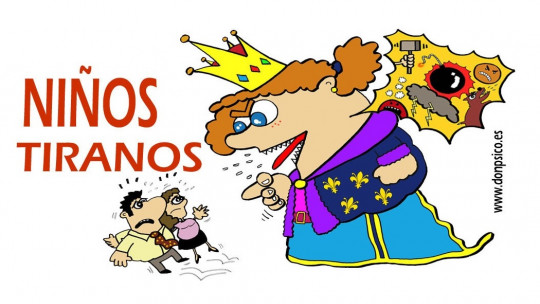
Raising and educating a child well is not easy Although most parents want the best for their children, the different ways of educating do not work in the same way for everyone. Thus, the educational strategies used are not always the most appropriate to achieve the autonomy and correct development of a boy or girl.
Overprotection, authoritarianism, ambiguity… all of this can lead to children forming an idea of reality that may or may not serve for their correct adaptation to the life circumstances in which they live. Among all these characteristics of different types of education we can find the exaggerated demand, which can cause various problems in children. For this reason, this article is going to focus on demanding parents and the seven aspects or things they get wrong.
Demanding too much: when discipline and effort are taken too far
There are very different ways of educating. The pattern of behavior that we use when educating our children, the way parents and children interact how they are taught, reinforced, motivated and expressed are what is called parenting style.
It is common that, in an increasingly liquid and dynamic society, many families choose to try to instill discipline in their progeny, trying to instill a culture of effort and motivate their children to always aspire to the highest and seek to achieve perfection. This type of parents They tend to require their children to be active, to try as hard as possible and manage to meet all the objectives set for them with the maximum possible efficiency.
Overly demanding parents tend to have an authoritarian parenting style, which is characterized by having a basically one-way type of communication and little expressive, with a clear hierarchy and providing clear and rigid rules, granting little autonomy to the minor and presenting a high level of control and high expectations regarding them. However, although discipline and effort are important, excessive demands can cause difficulties in the psycho-emotional development of boys and girls, such as those that can be seen below.
7 common mistakes derived from high parental demands
Using occasional demandingness as a way to increase performance can be effective. However, if it is a consistent pattern of behavior and is not accompanied by efficient communication and a coherent expression of feelings, in some subjects this educational style can contribute to causing different adaptation problems.
Some of the mistakes that especially demanding parents make They are the following.
1. Overexerting does not increase performance
Although encouraging effort and improving results can be useful to increase performance in a timely manner, maintaining a high level of demand over time can in fact have the opposite effect: performance may decrease by thinking that one is not good enough, or due to the persevering search for an improvement in the results obtained.
2. Intolerance of errors
It is common for demanding parents to not sufficiently reinforce their children’s efforts, nevertheless noticing the presence of some errors. For this reason, the idea that is transmitted to children is that error is something bad, which should be avoided. This forms a intolerance towards error which can lead to the next point, the birth of perfectionism.
3. Excessive perfectionism is not good
Excessive demands in childhood can cause children to feel that what they do is never enough, not feeling satisfied with what they do throughout their lives. Thus, these people develop the need to do things as best as possible, seeking perfection. In the long run This makes people not finish their tasks since they repeat them over and over again in order to improve them.
4. Unrealizable expectations are created
Believing in your own and other people’s possibilities is good. However, These expectations need to be realistic Expectations that are too high and unrealizable cause frustration due to the inability to fulfill them, which in turn can cause a negative self-perception of one’s own abilities.
5. Demanding too much can cause insecurity and low self-esteem
If the demand is not followed by recognition of the effort made, the boy or girl You won’t feel like your efforts have been worth it In the long run they can develop severe anxiety and depression problems, as well as learned helplessness when thinking that their efforts will not change the final result.
6. Focusing on compliance can cause a lack of self-motivation
Making a child focus too much on what they need to do can cause them to ignore what they want to do. If this situation occurs persistently, said boy or girl in adulthood presents emotional blockages and inability or difficulty in self-motivation because they have not finished developing their own interests in childhood.
7. It can cause problems in personal relationships
Children of very demanding parents tend to learn their parents’ level of demand and reproduce it in the future. Thus, it may be more difficult for them to socialize due to the high level of demand that they can present both towards themselves and with respect to other people in their relationships.
Recommendations to avoid these errors
The aspects mentioned so far are mainly due to the presence of pressure and high expectations, intolerance of errors and lack of reinforcement for one’s own behavior. However, being a demanding parent does not necessarily mean that these problems appear, can be avoided with sufficient communication and emotional expression Some tips or recommendations when avoiding the indicated deficits could be the following.
Accompany better than instruct
The pressure that these children feel is very high, sometimes being unable to do what they would like to do at the level that their loved ones would want. To avoid this, it is recommended that the expectations transmitted to children be realistic and adjusted to the capabilities demonstrated by the minor, avoiding extremism.
Regarding intolerance of mistakes, this does not occur if the child in question is taught that making mistakes is not bad nor does it mean failure, but rather they are an opportunity to improve and learn. And even in the case of failure, this does not mean that you stop loving them.
Value your effort and not your achievements
Much of the problem that this type of education produces is the non-valuation of the effort carried out The solution is to consider the importance of the effort made by children, regardless of the results, and help ensure that this effort comes to fruition. This is especially important when the child does an activity correctly, which is sometimes not praised as something normal and expected.
Confidence in children’s abilities is essential in order to motivate them and increase their self-esteem. In order not to devalue the children’s abilities, it is recommended that if there is something that you want to correct, you try to indicate it in a positive way and without incurring criticism, or focus everything on the activity or the objective to be achieved and not on the child and his ability.








